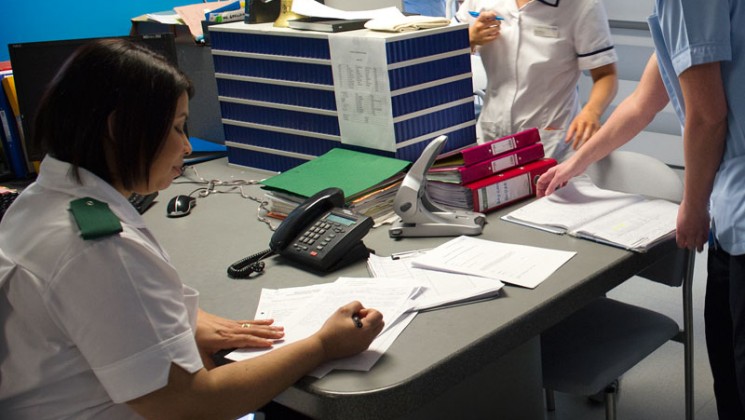Health
Health unions cancel strikes after Welsh Government’s pay offer

HEALTH unions in Wales postponed strike action due for this week following an improved pay offer from the Welsh Government.
This Monday and Tuesday (February 6 and 7), Wales would’ve experienced the worst strike action across the NHS as members of UNISON, GMB, the RCN, and the Royal College of Midwives were due to take strike action.
A Welsh Government spokesperson said: “This revised pay offer comprises an additional 3%, of which 1.5% is consolidated, so it will be in pay packets year-on-year, on top of the Pay Review Body recommendations, which have already been implemented in full. This offer will be backdated to April 2022. This revised package includes several non-pay commitments to enhance staff well-being, on which negotiations will continue next week.
“Whilst there is currently no improved pay offer on the table for NHS staff in England, it was also agreed that any resulting Barnett consequential following any improved offer to staff in England would result in a further pay offer to staff in Wales.
“We would like to thank those participating in the negotiations for their positive engagement and goodwill. We are awaiting a formal response from each of the individual trade unions.”
NO CERTAINTY STRIKES WILL END
While unions praised the Welsh Government for coming up with an improved offer, its acceptance is not guaranteed. Each will now consult with its members about the Welsh Government’s offer, and their members will decide whether to accept or reject it.
The amount on offer is on top of the 4.5% already imposed without negotiating with the unions.
Nathan Holman, GMB Welsh NHS lead, said: “After intense negotiations, GMB has agreed to suspend strike action while further talks take place.
“We recognise that the Welsh Government and Welsh Ambulance Service Trust have made concessions, and through social partnership, we appreciate the frank and open dialogue with them over the last few months.
“This has only been made possible because the Welsh Government has been prepared to talk about
As well as cancelling strike action scheduled for February 7, the Royal College of Midwives also suspended action short of a strike planned for February 7-14.
The RCM will consult its midwife and maternity support worker members on the new offer. Further talks are planned to address staffing shortages, working conditions and service pressures.
Julie Richards, RCM Director for Wales, said: “This has come about because of the determination of our members to make their voices heard and their readiness to act. It brought the Welsh Government to the table and led to this offer.
“WE WILL NOT HESITATE TO STRIKE”
Hugh McDyer, UNISON Cymru Wales head of health, said: “We are pleased that intensive discussion between the trade unions and the Welsh government resulted in an improved offer.
“The new offer contains an element that will be consolidated into healthcare workers’ pay, which is what UNISON has argued for throughout negotiations.
“UNISON’s healthcare committee will now meet to discuss the offer in more detail. UNISON will continue discussions with Welsh ministers on further improvements to employment conditions. We are determined to get the best possible deal for our nurses, midwives, healthcare assistants, paramedics, cleaners, porters, catering staff, admin staff and many more.
“After how they worked throughout the pandemic and how they respond magnificently to challenging situations every day, it is the least they deserve.
“It is important that our members now have their say. The decision to accept or reject this offer lies with them. We are pausing this action in good faith so that other issues – such as pressures on staff and working conditions – can also be addressed.
“Make no mistake though, we still have a very strong mandate for industrial action and will not hesitate to take it if our members reject the offer or if planned talks do not move forward as promised.”
RCN Wales Director, Helen Whyley, said: “Our strike action in December has been effective as the Welsh government has listened to the issues facing nursing in Wales and put forward an increased offer for nurses’ pay.
“Industrial action continues to be a last resort for nurses. I have heard their stories of the personal sacrifice they make daily, fighting for safe care for their patients, pushing them to vote for strike action. The pressure our members put on the Welsh government has been key to these negotiations moving forward.
“Our elected members have agreed that strike action proposed for February 6 should be cancelled and that we should put forward this offer to our members in Wales for them to decide whether it truly respects and values the nursing profession.
“The Health Minister should be under no illusion that we will not hesitate to return to strike action should the offer be rejected.”
WG HAD MONEY ALL ALONG
The Welsh Conservatives pointed to the elephant in the room, observing that the Welsh Government could have stopped industrial action and made an improved pay offer much sooner.
Shadow Health Minister Russell George MS said: “This only shows that for all of this time, despite saying it didn’t, the Labour Government had the money to give NHS workers a better pay offer.
“It is also welcome to see staff welfare being included as part of this package, as we have called for, because we know that poor working conditions have hit morale hard, with many complaining of ‘burnout’.”
Plaid Cymru called the Welsh Government’s pay offer “long overdue” and has criticised them for being slow to act on the NHS pay dispute in Wales, resulting in three months of industrial action.
Rhun ap Iorwerth MS, Plaid Cymru’s health and care spokesperson, said: “The Welsh Government U-turn on nurses’ pay is welcome but long overdue. If the Welsh Government had listened to Plaid Cymru, it could have avoided three months of industrial action. That’s three months during which the Welsh Government repeatedly told us there was no money when we had worked out the sums and proved it was possible!
“I’m only sorry that it took repeated strike action from our brave workers for Welsh Government to take responsibility and step up to the challenge.”
Health
Health board targets rise in steroid and gym drug use across west Wales

THE LOCAL health board has launched new targeted measures after recording a sharp rise in the use of steroids and other image-enhancing drugs across the region.
Hywel Dda University Health Board says needle exchange figures show significant growth over the past two years in people seeking support related to Image and Performance Enhancing Drugs (IPEDs), including anabolic steroids and so-called Selective Androgen Receptor Modulators (SARMs).
SARMs, while marketed online as safer alternatives to steroids, are illegal to sell in the UK and health professionals warn they carry serious and largely unknown risks.
The health board has now teamed up with Dyfed Drug and Alcohol Service (DDAS) and Choices, a young people’s substance use service, to tackle what officials describe as an “emerging public health challenge”.
Workshops and outreach
Two key initiatives have been introduced.
Educational workshops are being delivered to young people, focusing on the risks of using performance-enhancing substances during physical development and the potential long-term effects on hormones, mental health and fertility.
At the same time, enhanced support is being offered to people already involved in gym and fitness culture, with harm-reduction advice, health monitoring and confidential drop-in services.
Support includes testosterone testing, blood checks, cycle provision kits and discreet one-to-one consultations.
One service user described the programme as “quick, professional and non-judgemental”.
They said: “The drop-in clinic for my blood test was really convenient. I was seen quickly and given a full run-down of the services available. The staff made me feel comfortable the whole time and I got my results back faster than expected.”
Taking support into the community
The team has also worked directly with local gyms, leisure centres and sports venues, speaking to more than 100 people during five outreach sessions.
Twelve DDAS staff members have completed specialist IPED training delivered by Public Health Wales to strengthen expertise within the service.
Rachel Wilson, Resilient Families Manager at Choices, said the aim is to reduce stigma.
She said: “We’re proud to work alongside Hywel Dda to ensure people who use IPEDs are met with understanding, not judgement. These initiatives are helping us reach individuals who may not have previously considered accessing support.”
Craig Jones, Prevention and Population Health Improvement Manager, added: “This work is about meeting people where they are. By listening and responding with compassion and evidence-based care, we’re making a real difference.”
Dr Ardiana Gjini, Executive Director of Public Health, said the approach showed the board’s commitment to early intervention.
She said: “These initiatives reflect a proactive, collaborative response to emerging health challenges and demonstrate our dedication to protecting the health of our communities.”
Anyone seeking confidential advice or support can contact DDAS on 03303 639997 to book an appointment.
Health
Nurses warn of pay and burnout crisis as new report exposes pressures in Wales

A NEW national report has laid bare the growing pressures facing nurses and midwives in Wales, with concerns over pay, burnout and lack of professional development threatening the long-term future of the workforce.
The findings, published by the Nursing and Midwifery Council in its Spotlight on Nursing and Midwifery 2025 report, show that while many nurses remain deeply committed to their roles, large numbers feel undervalued, overstretched and reluctant to recommend the profession to others.
Responding to the report, Royal College of Nursing Wales said the data should act as a wake-up call for government and health boards.
Professor Sandy Harding, Associate Director of Nursing, Policy and Professional Development at RCN Wales, said:
“We welcome the determination and commitment shown by our existing nurses in Wales, with more than half surveyed saying they are satisfied with their day-to-day work and motivated by making a difference to people’s lives. However, the findings also present a stark reflection of the poor health of nursing in Wales.
“Too many nurses are not recommending the profession to others, are struggling and are facing abuse and discrimination in the workplace.”
Pay falling behind responsibility
One of the most pressing concerns raised in the report is pay.
Nursing leaders say salaries have failed to keep pace with the growing complexity of the job, heavier caseloads and the rising cost of living, leaving many staff feeling undervalued and financially squeezed.
For some, the pressure is forcing difficult decisions about staying in the profession or reducing hours.
RCN Wales argues that without meaningful improvements to pay, recruitment and retention will continue to suffer, placing further strain on already stretched hospital wards, community services and care settings.
Training and career progression gaps
The report also highlights inconsistent access to continuing professional development, with many nurses struggling to secure protected time or funding for further training.
According to the union, this not only limits career progression but risks undermining patient care in the long term.
Harding said: “Access to protected time and funding for continuing professional development remains inconsistent, undermining both career progression and the sustainability of the workforce.
“RCN Wales believes this is unacceptable and we will continue to support nurses and fight for fair pay, meaningful investment in professional development and better working conditions across Wales.”
Commitment remains strong
Despite the challenges, the report does note strong dedication among nursing staff.
More than half of those surveyed said they were satisfied with their day-to-day work and remained motivated by the difference they make to patients’ lives.
Health leaders say that commitment is a strength the NHS in Wales cannot afford to lose.
With around 35,000 members in Wales, the Royal College of Nursing says it will continue pressing ministers to address what it describes as a “workforce crisis” before it deepens further.
The union is calling for fairer pay settlements, safer staffing levels and guaranteed investment in training to ensure nursing remains an attractive and sustainable career.
Health
Doctor struck off after sexual misconduct findings at Withybush Hospital

Tribunal history reveals medic was removed in 2012 for dishonesty before being allowed back to practise
A DOCTOR accused of sexually harassing junior colleagues while working at Withybush Hospital had previously been struck off the medical register for lying about his qualifications, the Herald can reveal.
Dr Velmurugan Kuppuswamy is currently at the centre of fitness-to-practise proceedings after allegations he made sexually inappropriate comments and subjected two female doctors to unwanted physical contact during his time as a locum consultant in Haverfordwest.
But records show this is not the first time his conduct has come before regulators.
In 2012, an independent tribunal found he had been dishonest during an application and interview for a postgraduate cardiology training post at an NHS deanery in England.
The panel heard he falsely claimed to have submitted a Doctor of Medicine thesis, said he was a member of the Royal College of Physicians and stated he had passed a practical clinical skills assessment.
He initially admitted misleading information before later retracting parts of his account. The tribunal concluded he had “maintained his dishonest accounts” and had wrongly accused a witness of giving misleading evidence.
He was erased from the register and returned to India, where he later worked in a cardiac hospital.
In 2020, he applied to be restored to the UK medical register.
The General Medical Council investigated and opposed the application, arguing his expressions of remorse had come years late and raising concerns about a lack of independent evidence regarding his work overseas, as well as the absence of relevant ethics training.
However, an independent Medical Practitioners Tribunal at the Medical Practitioners Tribunal Service accepted his assurances that he had changed. His evidence was described as “compelling, heartfelt and genuine”, and the panel decided a well-informed member of the public would not be concerned about his return to practise.
His name was restored to the register.
Shortly afterwards, he began working shifts as a locum consultant at Withybush Hospital, which is run by Hywel Dda University Health Board.
Within months, fresh allegations emerged.
A tribunal has heard claims that between August and September 2021 he hugged junior colleagues without consent, touched their backs and waists, squeezed their wrists and arms and made sexually suggestive remarks at a staff social event.
On two occasions, he is alleged to have gripped one doctor so tightly it caused pain and ignored her requests to stop. He is also accused of staring at female colleagues, following groups of women around the venue, making comments about their bodies and placing a hand high on one doctor’s thigh.
Further allegations relate to behaviour at work, including sitting extremely close to a colleague, draping an arm behind her on a sofa and grabbing her arm while whispering comments.
According to the charges, his conduct created “an intimidating, hostile, degrading, humiliating or offensive environment” and amounted to a sexually motivated abuse of his senior position.
Dr Kuppuswamy denies wrongdoing.
Following the investigation, the case was referred to a tribunal by the General Medical Council. The decision on his fitness to practise was made independently by a Medical Practitioners Tribunal at the Medical Practitioners Tribunal Service.
The tribunal determined his behaviour amounted to serious professional misconduct and ordered that he be erased from the medical register.
Asked whether the doctor remains employed, the health board said it does not comment on individual staffing matters.
Medical director Mark Henwood said: “We have robust policies and procedures in place to ensure the safety of both staff and patients in our care and we take seriously our responsibility for their wellbeing. We are committed to providing a safe, supportive environment where patients and staff can be confident that best practice is being followed at all times.”
-

 Crime1 day ago
Crime1 day agoSex offender jailed after living off grid in Pembrokeshire and refusing to register
-

 News2 days ago
News2 days agoPrincess of Wales visits historic Pembrokeshire woollen mill
-

 Crime6 days ago
Crime6 days agoPembroke man accused of child sex offences sent to Swansea Crown Court
-

 Health4 days ago
Health4 days agoDoctor struck off after sexual misconduct findings at Withybush Hospital
-

 Crime6 hours ago
Crime6 hours agoTeacher injured and teenager arrested for attempted murder at Milford Haven School
-

 Community6 days ago
Community6 days ago50s women threaten legal action over pension compensation refusal
-

 Crime6 days ago
Crime6 days agoManhunt intensifies after woman seriously injured in Carmarthen park stabbing
-

 Education5 days ago
Education5 days agoIndustry insight helps marine cadets chart career course
































